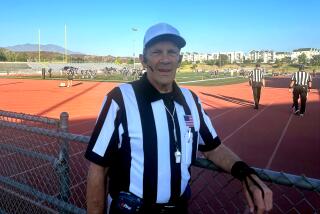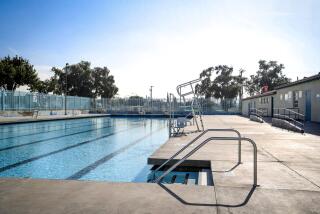Sands of Time Don’t Slow Down L.A. County’s Oldest Lifeguard
- Share via
Forget what the calendar says. It’s an endless summer for Cliff Hugoboom.
It has been that way for him since 1952--the summer he pulled his first floundering swimmer from a Redondo Beach riptide.
Hugoboom, 66, is Los Angeles County’s oldest lifeguard.
When he climbs into a tower, he draws double takes from beach-goers who expect to see someone a third his age on duty. Bikini-clad girls hoping to strike up a conversation stop in their tracks when they see a white-haired grandfather instead of a muscular young hunk.
“I know, I know,” Hugoboom says jokingly. “I don’t look a day over 65!”
Those who get in trouble along the South Bay beaches that Hugoboom watches over are happy to see him, however. He says he has rescued as many as 45 swimmers during a single weekend.
“A lot of lifeguarding has to do with knowing what you’re looking at and how to respond quickly,” said Bob Buchanan, the county’s lifeguard training officer. “Younger lifeguards may be as fast as a bullet. But their ability to see things coming sometimes takes a while.”
Hugoboom is no slouch in the water either. For the annual county lifeguard certification test, he swam around the Venice Pier this year in 12 1/2 minutes--three minutes faster than required.
Now “205 pounds of bone and scar tissue,” Hugoboom keeps fit by swimming daily at Mira Costa High School. He taught shop classes, driver training and pupils with learning disabilities at Mira Costa before retiring in 1986 after a 32-year career.
On summer days, weekends and holiday periods when he draws beach duty as a seasonal or “recurrent” lifeguard, he also swims in the ocean.
“I go as far south from the Redondo Pier as I can,” he said. “The water’s cleaner there. There’s so much pollution. . . . The water looked so filthy the other day that I felt like going up to people and saying: ‘Don’t go in.’ ”
Hugoboom didn’t, of course. Only health officials do that. Lifeguards only tell swimmers things like: Don’t use inflatable toys in the surf or don’t drink alcoholic beverages on the beach.
Despite occasional sewage spills and the gobs of tar that were washing up a few days ago, Hugoboom said beaches are cleaner and safer than they were when he started 40 years ago. That is because sand dredging has widened many of them, smoothing the ocean bottom near the shore and minimizing riptide conditions.
But ocean currents and wave action are still tricky for many beach-goers. Hugoboom once rescued his Redondo Beach next-door neighbor when she was about to be swept to sea.
“That evening my wife and I had wine on her front porch with her and her husband,” he said.
The county’s 110 full-time and 600 seasonal lifeguards average about 10,000 rescues a year, according to Division of Beaches and Harbors statistics.
Although most lifeguards are in their 20s, there is a low annual turnover rate, officials say. Because of that, the county’s guard roster includes 64-year-olds Bud Hustler of Torrance and Walter Hertz of Redondo Beach and Richard Garrett, 63, of Hermosa Beach. Hustler started work in 1946.
It was Hertz, a school buddy from Dorsey High, who introduced Hugoboom to lifesaving.
Hugoboom grew up in the West Adams area and was a star football player at Dorsey High between 1941 and 1944. His skills landed him a football scholarship at Arizona State University.
After college, he found work as a teacher at Lawndale Intermediate School in 1951. He was surprised to find Hertz teaching there too.
When the school year ended, Hertz told Hugoboom that he had a summer beach job that paid $1.25 an hour.
“He introduced me to the lifeguard lieutenant, who asked me if I could swim,” Hugoboom recalled. “I said ‘sure.’ ”
Hugoboom swam 1,000 yards to prove it. After a couple of weekend orientation sessions, he was assigned a tower during the summer of 1952.
Hugoboom said he has had few regrets since then. One is that he did not quit his teaching job and become a full-time, year-round lifeguard. Another is that he did not buy any oceanfront land when he was younger and it was cheaper, he said.
“I remember standing on a beachfront down there in the early ‘50s with a realtor,” he said, pointing southward from his guard tower toward expensive homes in the distance.
“I remember him saying: ‘Cliff, this might not be a bad deal for $17,000.’ ” But Hugoboom and his wife, Dolores, were starting a family that would include four children. Finances were tight.
Hugoboom often spent his days off at the beach, relaxing with his children on the sand. On one such visit, he said, he jumped into the water fully clothed to rescue a floundering swimmer.
His on-duty rescues have included tipsy fishermen who have toppled from South Bay piers and novice boaters who have fallen overboard so far offshore that Hugoboom has needed an 11-foot paddleboard to reach them.
Once, the harbor patrol shot a sick eight-foot blue shark that was menacing swimmers. Hugoboom pulled the carcass ashore, carried it home and buried it in his flower garden. “The roses loved it,” he said.
Other lifeguards laugh at the way Hugoboom dealt with one woman whom he found sunbathing topless. He informed her that he was not ordering her to cover up, but was “just advising you that there’s an ordinance against being topless,” one lifeguard said.
Young lifeguards say Hugoboom and other veterans carry their weight on the job. While others may swim faster, the older lifeguards have reflexes that cannot be beat, said lifeguard Scott Van Appledorn, 22, of Rancho Palos Verdes.
Van Appledorn admits to being surprised when he found himself working alongside Hugoboom and other 1940s- and ‘50s-era lifeguards when he was hired three years ago.
“When I first came on, I thought these old guys probably can’t swim. But my first week on I learned they are the best lifeguards.”
Lifeguard Betsy Snyder, 23, of Torrance agreed. She said the veterans are good-humored about sharing their beach knowledge with newcomers. “Cliff sees things earlier than younger lifeguards,” she said.
One thing Hugoboom cannot see now is retirement.
“My son Paul’s a lifeguard too. Earlier this year I told him that this would probably be it for old dad,” Hugoboom said.
“But now I think I might just try for 70.”
More to Read
Sign up for Essential California
The most important California stories and recommendations in your inbox every morning.
You may occasionally receive promotional content from the Los Angeles Times.














